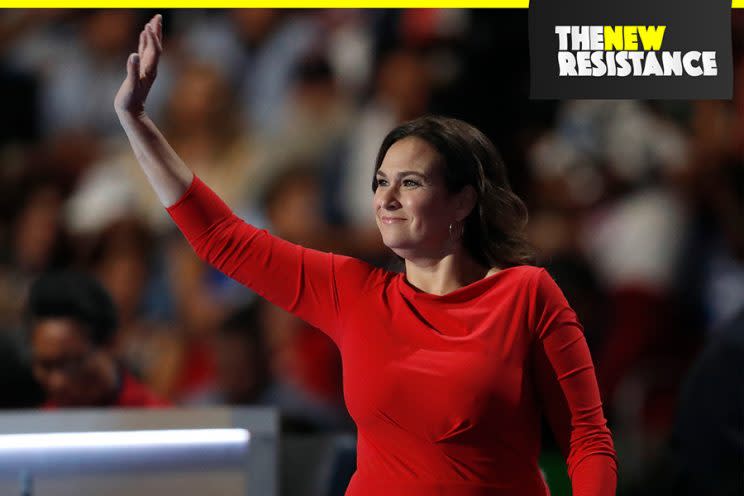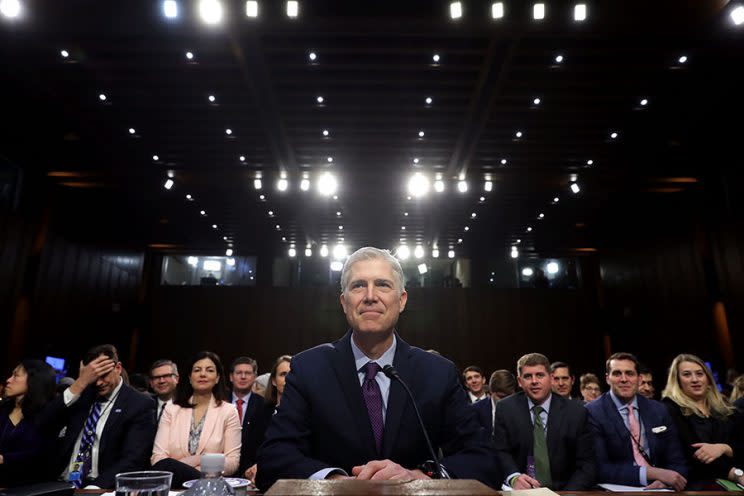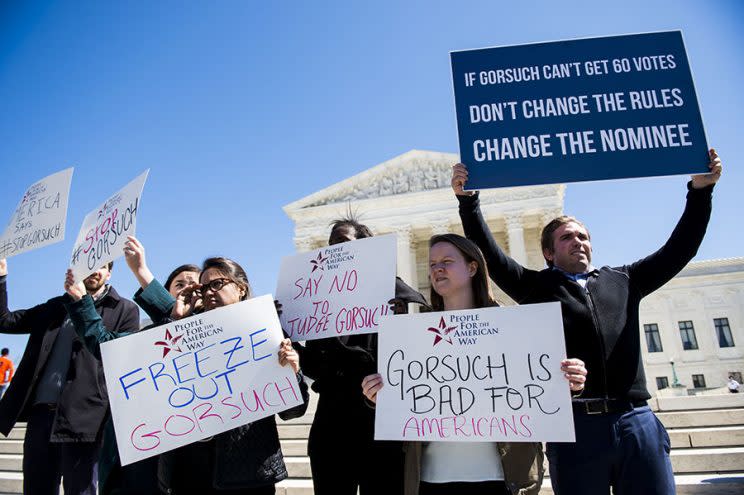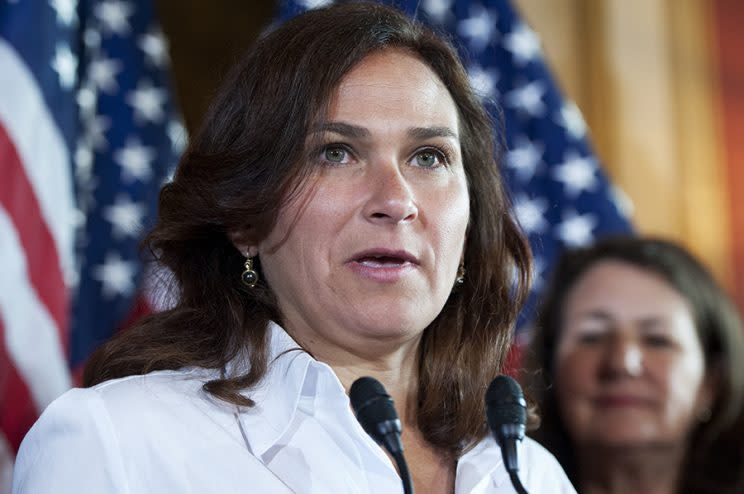One Woman Who Made Neil Gorsuch’s Confirmation Anything but Inevitable

When President Trump nominated Judge Neil Gorsuch 10 days into his presidency, Gorsuch’s confirmation by the Senate already seemed like a done deal.
Not only did Republicans control the Senate, but they also insisted that Gorsuch was the kind of nominee that everyone could easily get behind. He was quickly proclaimed to be a mainstream moderate and a “nice guy” who loves puppies. And even more quickly, his nomination was proclaimed to be a shoo-in.
Fast forward to today, when the Senate Judiciary Committee stands poised to vote on Gorsuch’s nomination and pass it along for a final vote to the full Senate, where the threat of a filibuster stopping his confirmation looms, the only guarantee is that negative headlines are certain for the Trump White House and Republican lawmakers who promised a much-needed easy win for the new administration’s first 100 days.
And there’s one woman who Republicans can thank for this latest wrinkle.
For Ilyse Hogue, 47, the longtime organizer and activist who has been the president of NARAL Pro-Choice America since 2013, Gorsuch was not only not inevitable, but opposition to his confirmation was essential — and in need of immediate attention. After all, over the course of his campaign for the presidency, Trump pledged to appoint a justice who would rule in favor of overturning Roe v. Wade. And NARAL was not going to not take Trump at his word, that whomever Trump nominated would make good on that promise.
Enter the People’s Defense, the coalition organized by NARAL and led by Hogue — an assemblage of the country’s largest grassroots groups including American Federation of Teachers, Indivisible, the Service Employees International Union, and Planned Parenthood Action Fund, among others — that just this Saturday, April 1, orchestrated more than a dozen “people’s filibusters” to give faces to the huge numbers of Americans opposed to Gorsuch’s nomination and a sense of their scope.

To see the images from the weekend’s events, it’s hard to imagine that pundits and Washington insiders alike ever declared Gorsuch’s confirmation inevitable — and uncontroversial.
“This is one of the things I’m most proud of my team — we don’t shy away from fights that we’re told are un-winnable,” Hogue tells Yahoo Style. “We think someone has to pick them.”
And so they did — to great effect.
A post shared by Ilyse Hogue (@ilyseh) on Apr 1, 2017 at 10:41am PDT
On Thursday, March 9, the People’s Defense announced their launch and intent to generate actions opposing Gorsuch in all 50 states in the U.S.
On Wednesday, March 15, 100 members of the People’s Defense joined Sen. Elizabeth Warren, D-Mass.; Sen. Jeff Merkley, D-Ore.; and Sen. Ed Markey, D-Mass., to deliver over 1 million signatures from the People’s Defense members on petitions opposing Gorsuch’s nomination.
On Thursday, March 23, Sen. Minority Leader Chuck Schumer, D-N.Y, announced at the close of Gorsuch’s hearings that not only would he be voting no on Gorsuch, but that he would also be planning a filibuster to stop the vote on his nomination.
“We let Democratic senators know from day one that we expected them to be tough on this guy,” Hogue says. And as the People’s Defense continued its work, Hogue says, “We went from being that this is inevitable and that this is an un-winnable fight to now, where it appears that Republicans are not halfway to 60 votes [needed to confirm Gorsuch].”
Hogue herself says that the Gorsuch fight is one that had to happen because “the more that comes out about Gorsuch, the more it appears that he is, at best, lacking compassion and, at worst, kinda cruel. There is so much evidence piling up that he takes a very inhumane look at the law. It’s like the Thomas Aquinas line: Justice without mercy is cruelty. There is a strain that runs through Gorsuch’s decisions that reflects either a total inability or total lack of desire to understand the human impact of his decisions.”

When it comes to reproductive rights, Gorsuch has a brief but — in Hogue’s opinion — worrisome record.
Gorsuch concurred with the 10th Circuit Court of Appeals while sitting on the bench there that the Affordable Care Act (ACA) forced crafting megastore Hobby Lobby “to violate their religious faith” by complying with the ACA’s contraception mandate, thus allowing corporations to have rights — and have rights that supersede those of individuals — but he also described the contraception mandate itself as a forceful “underwrit[ing of] payments for drugs or devices that can have the effect of destroying a fertilized human egg.” The forms of contraception in question were Plan B and other brands of the morning-after pill and certain forms of intrauterine devices (IUDs). Neither the morning after pill nor IUDs cause abortion.
Gorsuch also wrote an anti-choice dissent in a case challenging Utah’s barring of Planned Parenthood as a Medicaid provider, is on the record as believing that if public hospitals are permitted to perform abortions that “there is a danger” that they would also perform assisted suicides, and joined a dissenting opinion calling the ACA’s contraceptive mandate “a clear burden” on the “free exercise of religion” and said the policy would “not long survive.”
Gorsuch wrote a book arguing against physician-assisted suicide because of “the idea that human life is intrinsically valuable and that intentional killing is always wrong,” an opinion that many interpret as a direct through line to the personhood movement that would consider all fertilized eggs to be treated as fully formed human lives, thus effectively criminalizing not only abortion, but in vitro fertilization, some forms of contraception, and stem cell research. He also ruled against a transgender woman who was being denied access to hormone therapy while incarcerated.
Hogue also believes Gorsuch lacks human compassion in his decisions. He dissented from the majority in what has become known as the “frozen trucker” case, wherein Gorsuch disagreed with his peers on the bench of the 10th Circuit, who ruled that a trucker was not wrong for driving away in the cab and abandoning the trailer after his truck’s brakes locked up in sub-zero temperatures and the heat in the cab broke. The trucker radioed his company for help and waited for almost three hours as his feet and torso went numb before taking off in an attempt to save his own life. A service truck arrived 15 minutes after he ultimately departed — and Gorsuch believed that the trucking company was right for firing the trucker for abandoning his trailer, despite a law that prohibits a company from firing a driver who refuses to operate a vehicle “because the employee has a reasonable apprehension of serious injury.”
And in the midst of Gorsuch’s confirmation hearings, the Supreme Court decided that Gorsuch’s own opinion had been wrong in a case involving an autistic child whose parents sought placement for their child in a private residential facility because of their public school’s inability to meet the needs of their child educationally, a ruling of Gorsuch’s that many took as a callous reading of federal mandated rights for the disabled.
Through coalition building, organizing, and lobbying, Hogue and the People’s Defense have encouraged Democratic senators to announce their intent to join in filibuster efforts to stop Gorsuch from assuming the bench of the Supreme Court. And should Democrats filibuster, the only choice left for Republicans, should they seek to force Gorsuch’s confirmation, is using an action known in politics as “the nuclear option,” or employing a simple majority of 51 senators to change Senate rules last-minute to allow for a confirmation vote to pass with a simple majority instead of the traditional majority of 60 votes.
While the nuclear option might get Republicans Gorsuch, it still might not give Republicans the win that they were hoping for — and desperately need to shift headlines following the withdrawal of the vote to repeal and replace the Affordable Care Act (ACA) and reset the narrative regarding their ability to be a party capable of affective governing tactics, or lack thereof.
Longtime Democratic aide Josh Orton explains to Yahoo Beauty, “If McConnell pulls the nuclear option, he could do it with 51 votes and not need Pence [as the controversial tie-breaker] but then the headline would be all about breaking the Senate — not about Trump winning or Gorsuch — and it’ll be clear Democrats left everything on the field. And if McConnell loses two, Pence is in the chair to break the vote for the rules change — and now we’re completely upending the government. Do Republicans want that headline? That they broke the Senate for Trump?”
And when the final votes are counted when it comes to Gorsuch, regardless of the ultimate outcome, the lack of the easy win that Republicans thought was guaranteed can be largely credited back to Hogue and her vision for the People’s Defense.
NARAL’s research team began compiling information on each of the 21 judges named by Trump during his campaign as possible nominees to the Supreme Court as soon as they were announced in September 2016, weeks before Election Day itself.

“We decided to be laser-like in our focus,” Hogue says of NARAL’s early — and seemingly visionary — decision to focus on Trump’s nominee to the Supreme Court early on as the focus of their own organized efforts to resist. “We knew this would be an epic battle for us and everything we believe in.”
The aforementioned battle involved countering what Hogue describes as a three-pronged strategy that the White house and Congressional Republicans have utilized to “suppress a fight” when it came to Gorsuch from day one:
First, “chaos and distraction”: By flooding the early days of the Trump administration with a flurry of executive orders and cabinet nominees, it would be difficult for opposition to home in on where to focus first.
Second, “the charm offensive”: Promote that Instagram video of Gorsuch literally petting puppies — and emphasize how credentialed Gorsuch seems for the job for which he’s been nominated. (Or, as Hogue puts it, “He’s a dude in a suit with an Ivy League education and, unique to the Trump administration, he’s a judge applying for a judge job. This isn’t like Ben Carson or Betsy DeVos. But that seems like a low bar by which to judge a potential Supreme Court justice.”)
And third, the done deal: Make Gorsuch’s confirmation seem completely inevitable, as evidenced by the Republicans reminding Democrats, and the media, early on that the nuclear option is in fact a very employable option.
None of this, however, deterred Hogue. If anything, it only emboldened her to the cause.

“This is a lifetime appointment,” Hogue emphasizes. “So much of Trump’s agenda could be enshrined in the Supreme Court [if Gorsuch is confirmed] for the next 30 to 40 years, but we’re feeling the pendulum swing and people are understanding that [Gorsuch] is a really scary guy on the face of his decisions and rulings and records — and the American people want a fight.”
And it’s a fight that Hogue could see, even when others couldn’t, something that friends and former colleagues of hers tell me is a gift she has always had.

Orton tells Yahoo Beauty that he and a small handful of other progressive allies received a personal email from Hogue more than a month ago entitled, “Gorsuch free pass.” The first line of the email read, “The free pass Gorsuch is getting right now is killing me.” In the email, Hogue goes on to outline just why all eyes, and efforts, needed to be on stopping Gorsuch’s confirmation.
“She called me months ago saying we need to get ready for the Gorsuch fight,” Anna Galland, the executive director of MoveOn.org, recalls of Hogue’s early focus on Gorsuch and call to action on opposing his confirmation to Yahoo Beauty. MoveOn.org is one of the organizations that is part of the coalition represented by the People’s Defense.
Galland has known Hogue since 2007, and when asked to describe Hogue, Galland immediately replies, “She is a brilliant organizer. She has been a mentor for other brilliant organizers. And she is a brilliant campaigner who can sniff out impactful opportunities that others might be missing.”
And, Galland adds, Hogue “naturally maintains and just generates the biggest network of fiercely devoted friends and allies of almost anyone that I know. She has her ear to the ground in organizing circles and in grassroots circles. If it’s out there, she will hear about it. She is a master strategist — she knows what it takes to identify and play the long game, to identify a grueling fight, to think about the angles, to think about the potential strategies and assess them for their strengths. The combination of her unparalleled fiercely supportive and devoted network and her incredible campaign and strategy chops is what makes her so good at what she does.”
And she’s able to see a movement — and a fight — before anyone else can.
“Ilyse has the heart and soul of an organizer,” Orton says. “She sees the fight before other people do. She sees the fights coming that trample on people’s rights.”
“I think that the Gorsuch fight in a way is a perfect fight for Ilyse to map out because it is such an intersectional fight. The fight over this Supreme Court seat is a fight over the future of all the issues we care about. It’s a fight over our climate, a fight over reproductive health and women’s full humanity in America. It’s a fight about corporate power. And because Ilyse brings such a wide range of campaigning experiences to bear, she can see the importance of this fight and can start to think about all the angles from a long way off,” Galland says.

Before joining NARAL as its president in 2013, Hogue refined her activist chops at Greenpeace (during which time she was jailed for six days — and ultimately exonerated on all charged — for protesting the World Trade Organization in Seattle, in 1999), the Rainforest Action Network, and as the director of political advocacy and communications for MoveOn.org before going on to co-found the super-PAC Friends of Democracy, which worked to get money out of politics.
Galland continues, “The fact that we’re at the point where we are today with Chuck Schumer, the leader of the Democrats in the Senate, coming out to support a filibuster in the Senate, is a testament of the broad movement that Ilyse is at the forefront of building, a movement that gave [Schumer] the confidence in knowing that he has the support of the base of the organizations that support the base. No one presumed that Democrats in Washington would stand up and fight as hard as they are fighting on this Supreme Court nomination and the fact that they are is a testament to Ilyse’s leadership.”
Echoes Orton, “This momentum change is the product of Ilyse’s work. Rightly, most of the movement was focused on healthcare and distracted by the FBI stuff. But one of the reasons that this coalition exists, and has had the success it’s had, is that Ilyse saw multiple fights at once. We wouldn’t be where we are with the opposition to Gorsuch if not for Ilyse. She’s been crucial to conceiving the vision, figuring out who needs to be involved, and laying out the strategic plan. Six weeks ago, she was pissed that this major Supreme Court fight was about to be missed and that no one was talking about the implications for women and workers. From there, she went into organizer mode, the political strategist in her, the media savvy person in her, and just decided, ‘OK, I’ll do it.””
Or as Hogue tells it, “We did this because there was a space to be filled, and we had to do it to fulfill a promise to our members to fight with everything we have to protect women in general and abortion rights specifically, and there is no way to not shy away from that fight and not do this.”

Furthermore, Hogue adds, “The Trump victory helped people connect the dots that women will never be considered full, equal, empowered individuals in society if we don’t have dignity to make our own decisions over how and when we have families. And that story is emerging alongside that now is that this is the time for women’s leadership. If Trump is the dark side, what we’ve seen with the Women’s March and the 4,000 women who have filed to run for office since Trump’s election is that women were born for this. We were ready to be activated to lead us into the light. Our core origin story is on the line right now.”
And it’s Hogue’s unique ability to identify and articulate what is problematic to so many about Gorsuch before they even realize it for themselves that makes her such a key role model for so many young women who are just now beginning to enter the realm of activism as a result of Trump’s election.
“I tell my personal story because I didn’t start by running an organization, I started by volunteering my time,” Hogue says about those who might be looking to her for inspiration right now. “I did not get into organizing thinking it was a career path, but the right thing to do. And it got me excited — it made me feel like I was both a part of the process but also fighting for a process that had room for people like me in it.”
She continues, “We remind people every day through the work that we do that this is not about one person and can never be about one person. When it’s only about one person, that’s not enough energy to make change. When it’s only about one person, you end up with Donald Trump as president, who thinks things are all about him.”
And it’s why she thinks the People’s Defense has been so impactful, inspiring millions to add their voices to the opposition to what the addition of Gorsuch to the bench would mean for the Supreme Court.
“When people are offered the tools to empower, people step up, because justice is more in reach and because the majority of people believe in justice,” she says.
After all, Hogue says, those working for the People’s Defense “see ourselves as a conduit and not actual actors to allow senators to hear from actual people whose lives hang in the balance. It’s a victory for the Democratic process when you give people a chance for their voices to be heard.”
